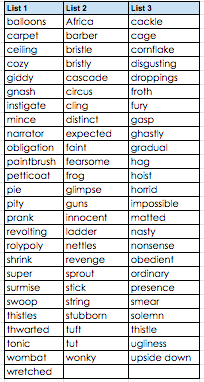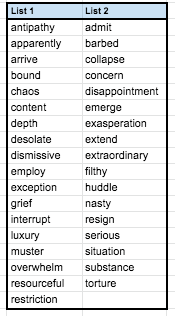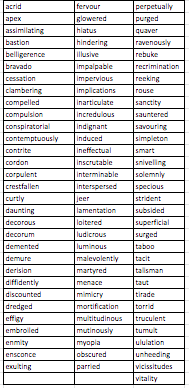
At ReadingWise we work closely with schools on our Vocab programme, asking them which books they'd like to see feature on our vocab word lists. And we regularly share word lists that have been created by schools with the ReadingWise community, using vocabularly taken from popular novels. Here we thought we'd take a closer look at some of these word lists and speak to the teachers using them with their pupils.
The Twits and The BFG by Roald Dahl

We spoke to Paul Donald, Principal Teacher at Walker Road School who has been using vocab lists from 'The Twits' and 'The BFG' by Roald Dahl.
What do you love about these books?
“I love how the lexical word choice of Dahl offers ambiguity and stirs the imagination. I read the books as a child and as a teacher now I find so many other meanings within his literature.”
What are your thoughts on the vocabulary used in the books?
“The vocabulary is the biggest hindering point in the children ascertaining literal meaning to then be able to draw inferences in their comprehension skills of reading. By targeting vocabulary instruction, it opens up the possibilities for comprehending the texts.”
How do your pupils feel about the books?
“They love the imaginative description of the books.”
How has the Vocab word list helped your pupils?
“We have observed an average increase of 5 or more months in just 14 weeks of intervention with significant gains for our EAL and ASN children. This is due to the Ebbingahus Forgetting Curve methodology behind the word lists that help children to reconsolidate subject-specific vocabulary whilst building on the background word list of the Tier 2 words.”
How are you using the vocab programme and with what outcomes in mind?
“At Walker Road School, we view vocabulary as being the necessary key in unlocking comprehension of a range of subject knowledge. The programme helps children build vocabulary through intervention-focussed and individualised word lists to develop a child’s sense of background knowledge in a subject or topic so that they can ascertain antonyms, synonyms and word roots so they can apply it in their talking, reading and writing. Our EAL learners particularly have benefited most, as it helps embed the L2 language. We utilise this alongside a child’s L1 language to ensure comprehension of both languages.”
Any final thoughts on using Vocab?
“The children love the shorter-snappier units on Vocabulary that provide instant feedback on progress through a unit. The colour-coded system of mastering and consolidating help children to self-assess their progress and it helps pin-point specific instruction for planning next steps in learning of the children. It is easy for the children to navigate and the images help children to develop background knowledge and develop sense of word roots to unlock other areas of the curriculum.”
The Boy in the Striped Pyjamas by John Boyne

We asked Dawn James, Year 6 teacher at St John the Evangelist Catholic Primary School in Staffordshire, about 'The Boy in the Striped Pyjamas' word list which her pupils worked on.
What doe you love about the book?
“The book links well with our History WWII topic and draws the empathy of the children into it far more than just teaching historical facts. Many pupils cry at the end of the book and have a heightened understanding of the horrors of the holocaust.”
What are your thoughts on the vocabulary used in the book?
“The vocabulary is extensive in both Tier 2 and Tier 3 words. The pupils are able to incorporate the new vocabulary into their writing tasks that are drawn from the text but can use them across the curriculum and further genres too.”
How do your pupils feel about the book?
“Most felt that it was a very powerful book. They were glad that we had it as a whole class text as they did not feel that it was reading for pleasure material but they found it stimulating.”
How has the Vocab word list helped your pupils?
“The Vocab list aided understanding of the text and assisted children who did not always keep up their own Guided Reading Journal Vocabulary banks as they needed to concentrate on the flow of the story when reading. More able pupils who mastered the Vocab list were observed using the language in both written and oral work.”
Any final thoughts on using Vocab?
“We're finding that the upper KS2 children are finding it easier to access and benefiting more from it. From a subject leader perspective, it is a great data source and class teachers are able to quickly check that the pupil homework allocation is completed. We won't have the full progress picture until I've inputted the Spring reading ages and there are some parts of the programme that I need to explore further to ensure that we maximise its potential but it is a great resource and fits well into our school action plan.”
Lord of the Flies by William Golding

We spoke to Katie Neil, Literacy Coordinator at Southchurch School in Southend-On-Sea. We asked her about the ‘Lord of the Flies’ wordlist that they created and shared with our community.
What are your thoughts on the vocabulary used in the book?
“Clearly some of the words used in the book are becoming obsolete – words like ‘corpulent’, ‘vicissitudes’ etc. So it’s highly likely they won’t naturally be in our students’ vernacular, which is why it’s great to have this programme to really drill those meanings in! I chose the words that I thought the students won’t or might not know the definition of.”
Any thoughts on using the Vocab programme going forwards?
“Our students have only just started studying the text in the last week or so. I’m looking forward to getting the students onto this word list and excited to see how it helps the teachers. I think it will make a great homework task or starter activity.”
Which book would you like to see in our Vocab word lists? Why? Let us know! And check out #NewWordsWednesday
=============================









